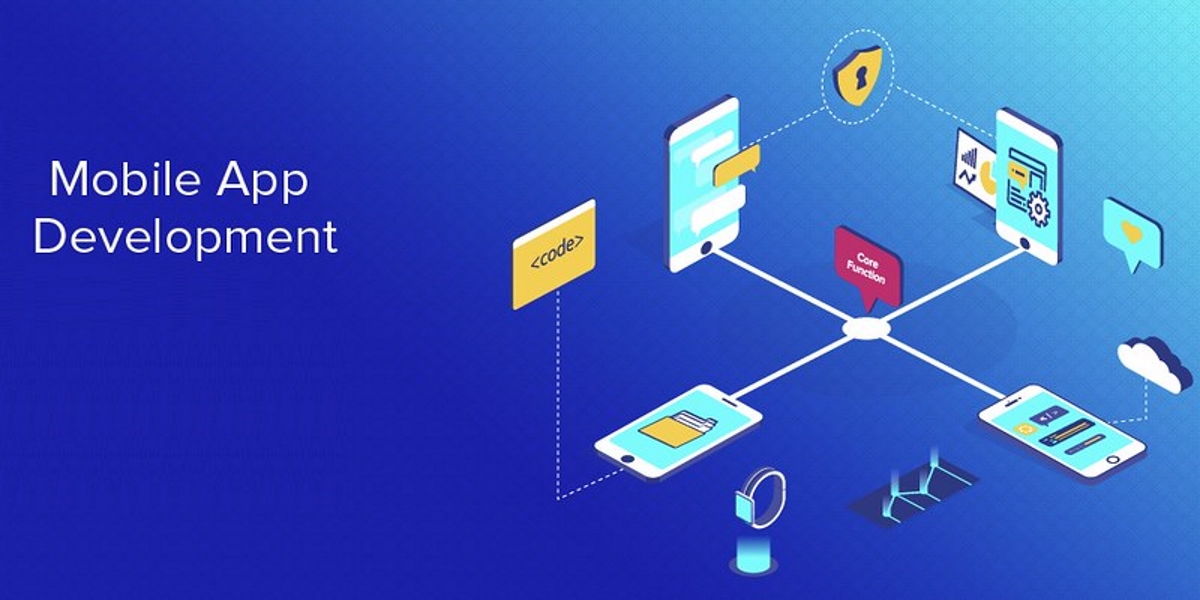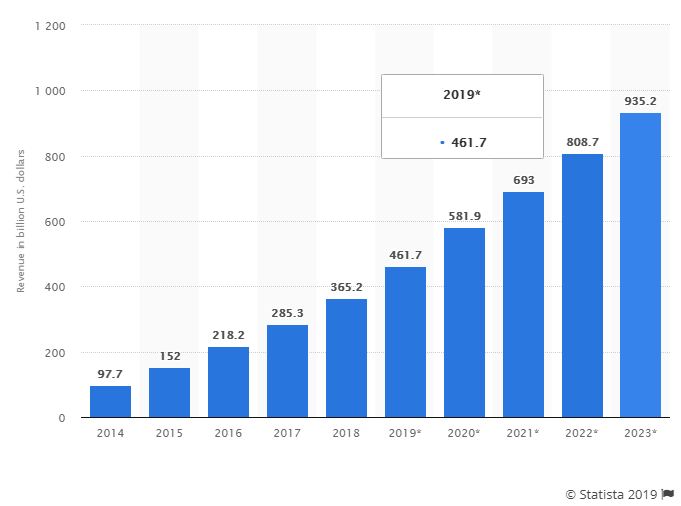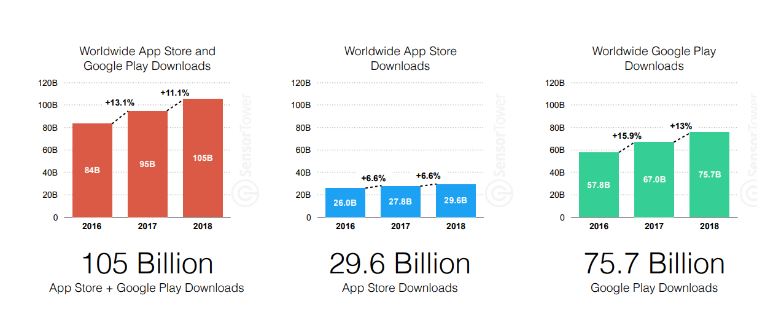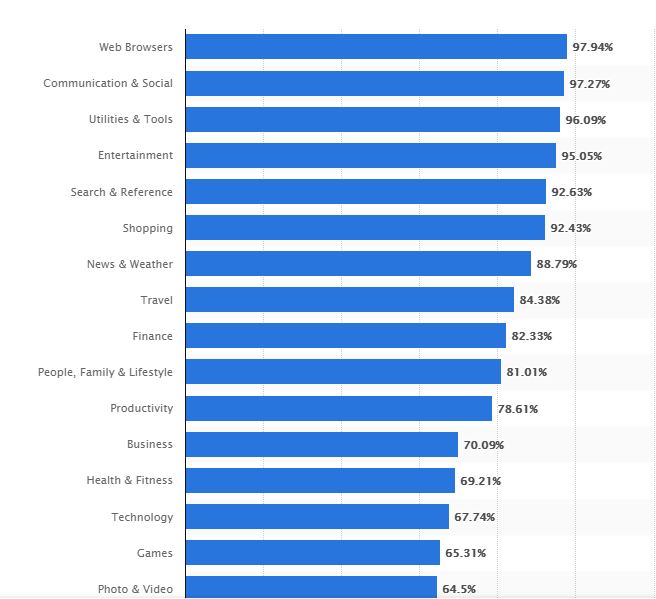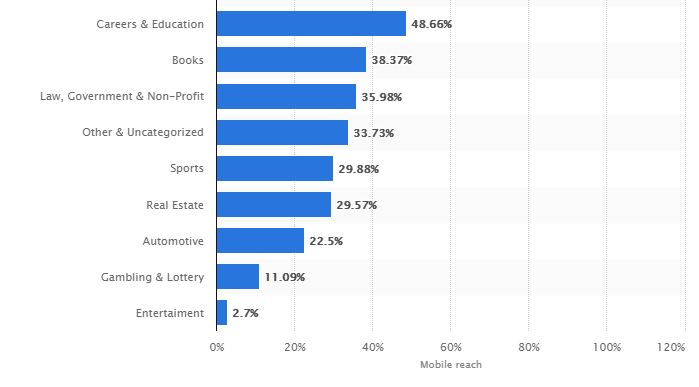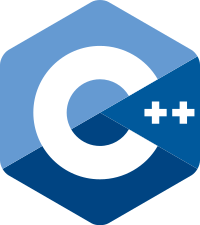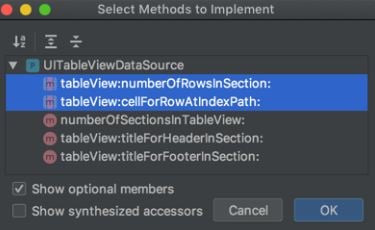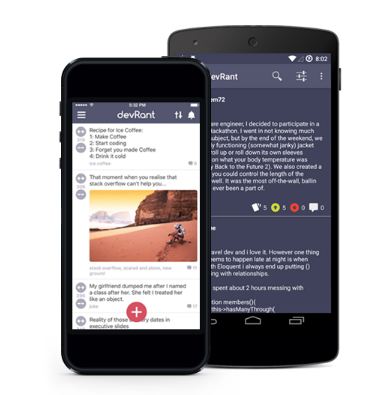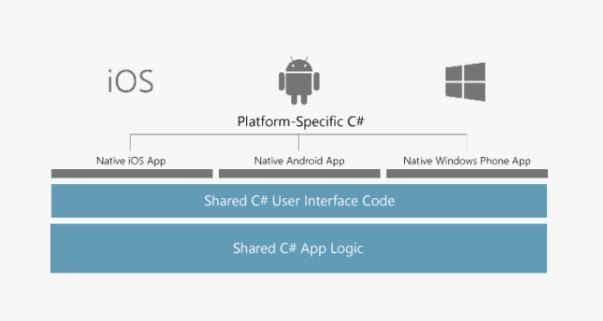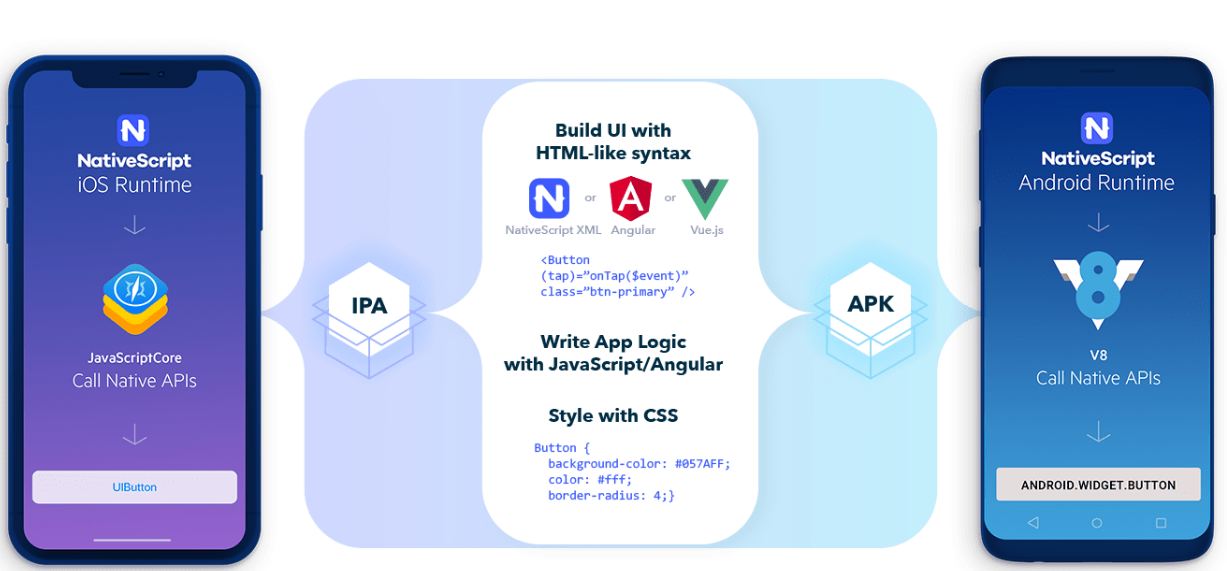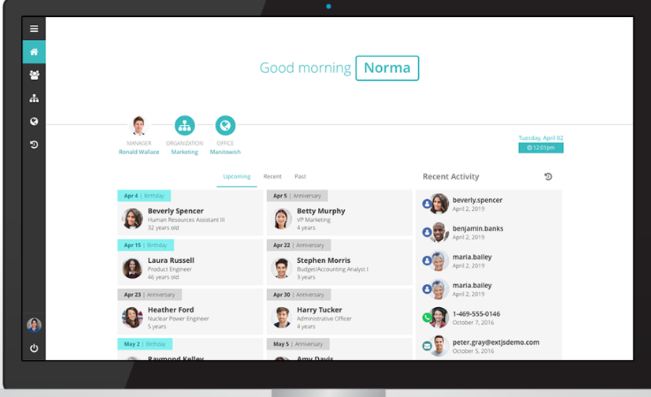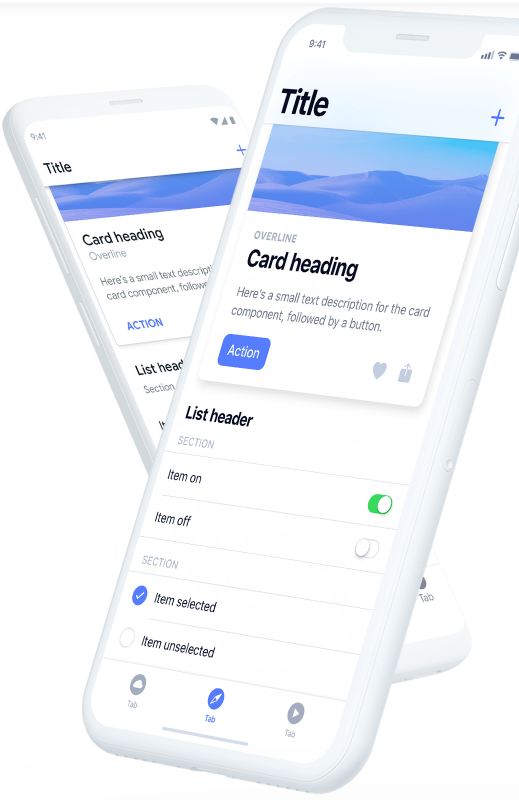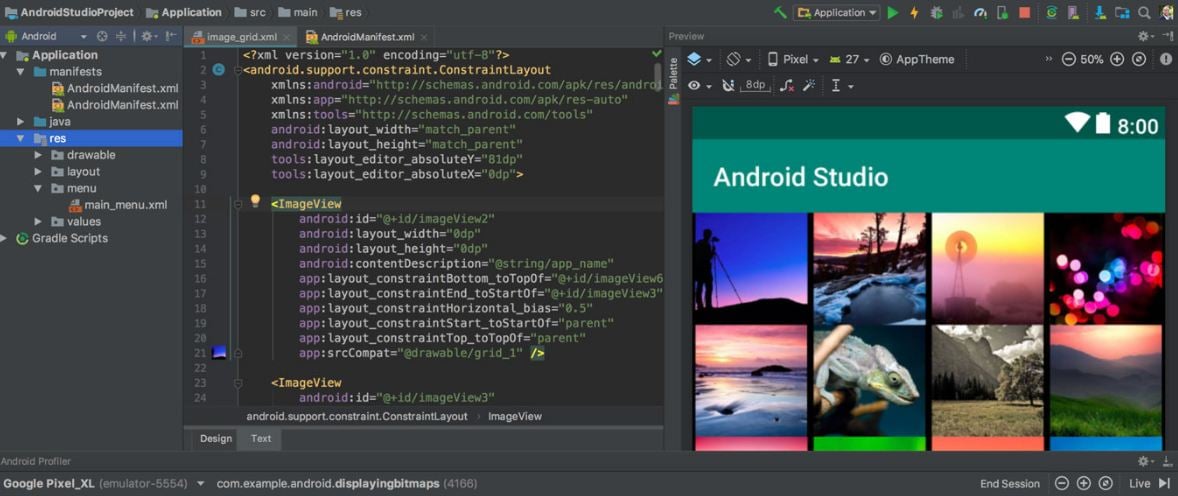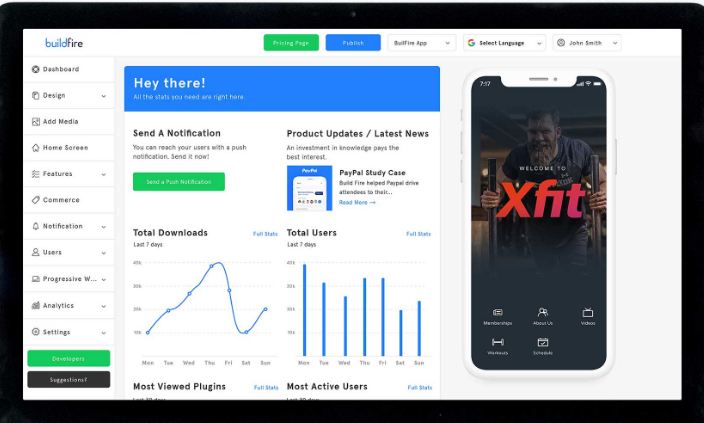The importance of mobile applications in business and everyday life cannot be emphasized enough. In our everyday life, mobile apps allow us to order food, buy train and bus tickets on the go, shop, learn, perform banking transactions, and do lots more.
For businesses, the benefit of mobile apps includes, but is not limited to, the following:
* Ensuring visibility to customers at all times
* Providing value to your customers
* Creating brand awareness
* Enhancing customer engagement
* Gaining a competitive edge
* Encouraging customer loyalty
* Creating a direct marketing channel
It is beneficial for businesses to have a mobile app because the average American spends more than two hours a day on their mobile device. This is the finding of a 2014 study by Flurry Analytics. Following is an infographic that shows a breakdown of this:
From the above, we find that the majority of the 162 minutes that an average American spends on their mobile devices in a day is spent using mobile apps, 86% of that time to be precise. Only 14% of that time or less than 23 minutes is spent on browsers.
Gaming apps consume most of the time spent on apps during a day. Second by some distance is the Facebook app followed by social messaging apps, YouTube, and other entertainment apps.
Although the above infographic does not indicate this, by developing a business app, organizations everywhere can connect with customers on the go in a fruitful way. This is because their mobile phone is one thing that people cannot be without; they take it with them everywhere they go. This makes mobile application development incredibly important and useful. Important because it will help to remind your customers or target audience about your business. Useful because it can help you to keep your customers/target audience updated with any new products features, discounts, rewards, etc. offered by your business.
Here, we will be looking at and comparing the top 10 mobile app development tools available today. However, before we get to that, we will answer the frequently asked questions (FAQs) about mobile app development, looks at some key statistics and facts related to the mobile app development market, and discuss the key technologies used by app developers or
top app development companies to develop mobile applications. Let’s get started.
Frequently Asked Questions About Mobile App Development
Q#1) Is it Necessary to Have a Mobile App for My Business?
This is the first and foremost thing that most business owners want to know before they invest in mobile app development. The answer is that it depends—it depends on your business objectives and what you want to accomplish from the app development. If your goal is simply to provide mobile-friendly content to your audience, then optimizing your website for mobile use would be a better option.
On the other hand, if you want to better engage, interact, and communicate with your customers and target audience, then investing in mobile app development is recommended. Not only can a mobile app be your personalized communication tool, but it can also help you leverage location usage behavior, user interests, and more to develop products designed specifically for the target audience. Over time, a mobile app will help you to drive increased customer loyalty.
Q#2) How Do I Validate My App Idea?
You have every right to believe that the idea you have for your business app is unique and that it solves a specific problem. However, over-confidence can sometimes lead to trouble. Therefore, it’s best that you validate your app idea to find out if it’s any good. You can do that by:
* Determining the size of your potential market
* Listening to what your audience is saying (on customer-review sites, community forums, and social media groups)
* Finding Out the latest trends in the Apple Store or Google Play
* Creating a Minimum Viable Product for testing
* Creating a ‘Coming Soon’ launch page for the app
Similar to a prototype, a Minimum Viable Product (MVP) is created with the intention of testing an app to see how it performs in the real world. On the other hand, the purpose of ‘Coming Soon’ launch page is to clearly communicate the Unique Value Proposition (UVP) of an app. The rest is self-explanatory.
Q#3) Which Platform is Better for Launching My App: iOS or Android?
The best platform for launching your app will depend on several key factors including budget, demography, time to enter market, etc. Since iOS and Android are two entirely different platforms, the language used to develop apps for these platforms will also differ. To make the right choice of platform for your app, you should consider:
* The demographic you want it to target
* The platform a majority of your target audience uses
* The amount of money you can realistically invest in the project
Q#4) What Techniques are Involved in Mobile App Development?
App developed companies use native, cross-platform and hybrid approaches to develop mobile apps. A host of technologies and tools are used to create these types of apps. For example, some of the tools and technologies involved in native app development are C#, Swift, Objective C, and Java. On the other hand, cross-platform app development involves tools and technologies such as JavaScript, CSS3, PhoneGap, HTML5, Titanium, Corona SDK, Xamarin, Sencha Touch.
Q#5) How Much Does It Cost to Build a Mobile Application?
This is perhaps the most commonly asked question about mobile app development. Unfortunately, we can say for sure how much mobile app development will cost you. This is because developing a mobile app is not a fixed cost. Instead, it is a variable cost which depends on the platform you wish to launch the app on, the app functionality and features, the cost of maintenance, the cost of hosting the app, the cost of any third-party integration, and the application security cost.
Q#6) How Will My App Make Money?
Although not everyone develops an app to make money, knowing how an app can make money is always useful. In fact, the success of any mobile app depends on choosing the right app monetization model. On top of that, choosing the wrong strategy will negatively impact the overall user experience. So, how can you make money from your app without compromising its users’ experience?
You need to consider several factors to arrive at the right or best monetization model for your app. The first and foremost thing that you need to consider is what is it that your app does. This will allow you to get a better idea of which monetization model is best suited to your app.
For example, if your business is in the news, music, or entertainment industry, then you can choose a subscription model for your app. On the other hand, the best monetization model for apps that are centered around products like retail and shopping items is an in-app purchases model. Following are the other monetization models available for apps:
- Freemium
- Pay Per Download
- Advertising Based
If you’re not sure about which monetization model is the right one for your app, then you should seek guidance from an app development company to get a better idea of this.
Q#7) What are The Benefits of Outsourcing to a Mobile App Development Company?
There are several key factors that companies need to consider when looking to develop an app for the business. Perhaps, the first and foremost thing that a company must consider for app development is who is going to build/develop it.
While there are a few companies with an in-house team that specializes in software and app development, most companies outsource to a
mobile app development company. However, it is critical for companies to outsource to a company with experience and proven expertise in mobile app development.
Even if you have an in-house IT team that can develop software and apps, you’re better off outsourcing mobile app development. Why is that? Because having to take on a mobile app development project for the company in addition to their regular duties may be too much work for your IT people and they can easily get overwhelmed; this is likely to affect the productivity of their regular work. No company wants that!
By outsourcing to a mobile app development company, you get a dedicated team for your mobile app development project; they have no distractions and they perform app development extremely carefully to ensure you get what you want—within your budget. What more do you need?
Fact Check About the Mobile App Development Market
More than 5 billion people use mobile phones today. Of these,
over 55% have accessed the internet on their mobile device. Now comes the interesting part or the bit you’re most likely to be interested in: the number of apps downloaded on mobile devices in 2018 was
194 billion. This is an increase of 16 billion from two years earlier.
This trend is likely to continue in 2019 and the next few years. In fact, we already have evidence of this as Statista reports that, as of August 1, the worldwide revenue collected from mobile apps in 2019 was
US$ 462 billion. Additionally, Statista’s predicts this revenue to increase to
US$ 935.2 billion by 2023. Following is an illustration of this:
The above figures from Statista give an indication that the mobile app development industry will grow rapidly in the next few years. So, which platform is contributing most to this revenue? Is it the App Store or Google Play? It is latter according to the figures and stats provided by Sensor Tower in its 2018 Data Digest. Following is an infographic that shows the exact number of downloads made on both Google Play and App Store in the years 2016-2018:
According to
Allied Market Research, China and the U.S are the two biggest mobile application markets. We already know that an average American spends 162 minutes per day on their mobile devices. So, what are the most popular app categories amongst Americans? Following is a graph from Statista that provides a breakdown of this:
The statistics related to the global and the U.S app development market are endless. However, the above statistics provide us with a good idea of the state of the app development market both globally and in the United States. What we decipher from the above statistics is that the global and U.S app development markets are growing at a rapid pace and companies have a lot to gain by developing an app for their business.
Pro Tip:
While the signs are encouraging for anyone looking to develop an app over the next few years, it is critical that you stay up to date with the latest research and major trends in app development and your industry/target market before taking on or outsourcing an app development project for your company. This will serve you well in the long term.
The Key Technologies Used by App Developers to Develop Mobile Applications
Whether the app development is being performed for a native, cross-platform or hybrid platform, the following technologies or programming languages are commonly used by
top software companies to develop a mobile app.
#1) C++
The foundation for most programming languages, C++ is equipped with capabilities to develop enterprising apps. Using a compiler-based approach, which is a simple yet effective approach to app development, C++ can help to develop apps on multiple platforms, thanks to its versatility. In the past, Objective-C, the sister language of C++, was used to develop apps in Apple systems.
#2) Swift
Swift is the programming language or app development technology you need if you’re looking to develop something specific for your business. This is because the Swift programming language/technology requires minimal coding and is equipped with advanced features.
#3) PHP
An object-oriented programming language, PHP is easy to learn and practice; additionally, it aids the development of enterprising mobile and web applications using a three-layered model. PHP is an arguably the best app development technology or programming language for apps needing database integration.
#4) Java
The official language for apps developed for the Android platform, Java is objective-oriented and easy to handle programming language;
app developers using this app development technology have many open source libraries to choose from.
#5) HTML5
HTML5 is the go-to app development technology or programming language for companies that want to create web-frontend apps for mobile devices.
List of Best Mobile App Development Tools
Today, a host of highly sophisticated tools are available for developing mobile applications. Many of these tools have multi-platform capabilities and come with advanced features that make them perfect for creating apps from scratch. Here, we will be reviewing the top 10 mobile app development tools available today. Several factors have been considered to come up with this list.
Comparison of the Top 5 Mobile App Development Tools
We will review in detail the top mobile app development tools available today. However, the following table compares only the 5 best mobile app development tools available today according to our research.
|
Tool Name
|
Platform
|
Development Type
|
Programming Language
|
Our Ratings
(*****)
|
Features
|
|
Xcode
|
iPhone, iPad, Mac, Apple Watch, Apple Tv
|
Native
|
Swift
|
4/5
|
Declarative Syntax, Native on all Apple platforms, drag-n-drop functionality to create or edit interface, live mode, in-depth testing
|
|
AppCode
|
iOS, macOS
|
Native |
C, C++, Swift, Objective-C, JavaScript, CSS, XML, HTML
|
4/5
|
Intelligent development environment, efficient project navigation, smart completion, reliable refactorings, thorough code analysis
|
|
Appcelerator
|
iOS, Android, Windows Phone
|
Cross-Platform
|
JavaScript
|
5/5
|
App builder supported by JavaScript, live app preview, user-friendly app builder, reusable code, multi-language interface, ability to incorporate third-party libraries, direct access to APIs
|
|
Xamarin
|
iOS, Android, Windows Phone
|
Cross-Platform
|
.Net, C#
|
4/5
|
Integration for Android and IOS, custom controls, various code signing, visual studio integration, diagnostic tools, storyboard files, Android SDK manager, application loader, PCL, Google emulator manage
|
|
NativeScript
|
iOS, Android
|
Cross-Platform
|
CSS, JavaScript
|
4/5
|
Native performance, extensible, cross-platform, easy to learn, free and open source, strong backing
|
Review of the Best Mobile App Development Tools
#1) Xcode
One of the best and most cost-effective tools for creating apps for Appl devices, Xcode provides users with a productive app development platform by cohesively integrating with the object-oriented Cocoa and Cocoa Touch frameworks or Application Programming Interfaces (APIs).
In addition to the above, workflows are made seamless by the incredibly smooth environment of the Xcode. Although the tool has many advanced features, the best or most noticeable thing about Xcode is its built-in Assistant Editor; this feature allows users to quickly build apps by providing them with useful codes on a side pane.
Another key aspect of the Xcode app development tools is that it comes with functionalities that allow you to communicate with the Apple developer website. What is the benefit of this? As a user of this tool, you can enable the services of Apple on your app and then publish your app on the App Store when it is ready.
Features:
Declarative Syntax, Native on all Apple platforms, drag-n-drop functionality to create or edit interface, live mode, in-depth testing
Cons:
- No Pull Request Support
- Debugging is extremely difficult
- Additional management needed for servers and bots
- No cross-platform support
- Not suitable for distributed teams
Development Type:
Native
Programming Language:
Swift
Platforms:
iPhone, iPad, Mac, Apple Watch, Apple Tv,
Price:
Free
Website Url:
#2) AppCode
An innovative IDE environment, AppCode is designed for IOS and macOS development. Designed by JetBrains, AppCode allows app development companies to code faster and develop applications for all Apple devices including iPhone, iPads, and Macs.
Capable of handling routine tasks efficiently, AppCode analyzes the code structure and eliminates the need for tedious typing; additionally, it is built to facilitate the completion, navigation, refactoring, and analysis of code with greater accuracy.
This tool combines the IDE environment and its in-depth understanding of code structure to make the development of IOS and macOS apps simpler. People using the tools are provided with all the tools that ensure the swift execution of ideas without any hindrance.
The refactoring and code generation module of AppCode is one of the best features of this tool. Why is that? Because it provides several functionalities that can handle routine tasks; this frees up the users/developers to focus on the more important tasks in the app development process.
In addition to the above, AppCode enables users to improve the code design smoothly by providing them with a wide range of code refactorings. Another key feature of this tool are its live templates; these innovative snippets of code makes it a breeze for developers to create apps that involve complex programming language.
Last but not least, this tool provides users with the ability to customize the user interface. This means that users of AppCode can modify the tool to create a customized AppCode user interface according to their unique requirements or work. Overall, the AppCode app development tools have been designed to make the app development convenient for users.
Features:
Intelligent development environment, efficient project navigation, smart completion, reliable refactorings, thorough code analysis
Cons:
- Its editor is clumsy with code indentation
- Not possible to run a separate test in test class
Development Type:
Native
Programming Language:
C, C++, Swift, Objective-C, JavaScript, CSS, XML, HTML
Platforms:
IOS, macOS
Price:
US$ 9.73 per month
30-day free trial
Website Url:
#3) Appcelerator
This is an app development tool that uses the popular scripting language JavaScript. Appcelerator significantly reduces the time needed to build cloud connective and rich native mobile apps. Additionally, the apps built using this tool are compatible with iOS, Android, Windows Phone platforms.
The IDE of Appcelerator provides users with all the tools that they need to develop mobile applications for the above-mentioned platforms. Featuring a layout with three columns and panels on both sides of the main canvas that can be customized, Appcelerator’s IDE has a main canvas with a Design and an XML tab.
Using the XML features, users can write the entire code. On the other hand, they can get a preview of the app at the same time they are writing the code using the design tab; this allows users to drag and drop elements.
In addition to the above, code reuse is enabled in Appcelerator, which is another great benefit of this tool. According to the company that owns the tool, Appcelerator allows the reuse of 90 percent of the code across various platforms. For users who want to build native apps, this is a major advantage.
Through the Hyperloop feature, Appcelerator also allows access to several APIs. For example, the feature uses JavaScript to allow direct access to Android and IOS APIs. On top of these APIs, you can integrate third-party libraries to extend your app’s scope. Additionally, the tool provides you with the ability to Swift, Objective C, or Java code alongside Titanium code.
Lastly, in order to assist visually designed apps for IOS, Android, or Windows app, the Appcelerator tool is equipped with drag and drop functionality. Moreover, you can use the preview window to keep track of the changes you make in real-time.
Features:
App builder supported by JavaScript, live app preview, user-friendly app builder, reusable code, multi-language interface, ability to incorporate third-party libraries, direct access to APIs
Cons:
- Increasingly complex
- Flexibility limitations
- Laggy
Development Type:
Cross-Platform
Programming Language:
JavaScript
Platforms:
iOS, Android, Windows Phone
Price:
US$ 199 per month
60-day free trial
A free version is also available
Website Url:
#4) Xamarin
A simplified and streamlined app development tool for Windows mobile, Android, and IOS, Xamarin uses .Net and C# to create applications for all mobile platforms; the best thing is that Xamarin can create these apps simultaneously and without starting from scratch each time.
A tool that provides cross-platform mobile development benefits, Xamarin uses C# to provide the right kind of support for large applications; additionally, it uses PCL for interactions at the backend. Type checking is also supported by this tool which enables users to identify and correct errors before the applications reach the end-user.
For every app that you wish to develop in the future, you can use the same C# code that you used in the past for app development. Moreover, the tool provides you with two IDEs. This is one of the key aspects of Xamarin that distinguishes it from other tools.
Using the Xamarin tool, you can develop unique and highly sophisticated apps. This is made possible by the tool’s platform-native feeling, and user-friendly interface that allows users to respond to every request that comes in from customers. Another impressive feature of Xamarin is its smooth integration with Visual Studio. This allows users to build mobile-responsive apps conveniently from their desktops. Lastly, Xamarin allows the testing and debugging of apps through the Android SDK.
Features:
Integration for Android and IOS, custom controls, various code signing, visual studio integration, diagnostic tools, storyboard files, Android SDK manager, application loader, PCL, Google emulator manager,
Cons:
- Doesn’t support all third-party libraries for the different platforms
- Large size of apps
- Not suitable for apps with heavy graphics
Development Type:
Cross-Platform
Programming Language:
.Net, C#
Platforms:
iOS, Android, Windows Mobile
Price:
US$ 25 per month
free trial
Website Url:
#5) NativeScript
An open-source framework, NativeScript allows users to build native apps for Android and IOS platforms; the app development is performed using only a single codebase, the available libraries, and commonly used programming languages such as CSS and JavaScript.
With NativeScript, you can build truly native apps for Android and IOS; additionally, the tool can help minimize the learning curve by deeply integrating with popular JavaScript frameworks such as Vue, and Angular.
In addition to the above, the NativeScript app development tool allows code to be shared extensively between web applications and mobile platforms. Lastly, this app development tool can help to speed up the delivery of high-quality mobile apps to multiple platforms.
Features:
Native performance, extensible, cross-platform, easy to learn, free and open source, strong backing
Cons:
- Difficult to share code with a web build
- Support for NS-Vue is not optimal
- Documentation could be better
Development Type:
Cross-Platform
Programming Language:
CSS, JavaScript
Platforms:
iOS, Android
Price:
US$ 19 per month
Free version
Website Url:
#6) Adobe PhoneGap
A tool that allows users to work with a single code base, Abode PhoneGap is basically a set of HTML pages put together in a native application shell. A cross-platform and open-source platform, PhoneGap pushes out these HTML pages through native APIs to native platforms. The tool can build apps using JavaScript, HTML, Web, CSS, and Web APIs.
In many ways, developing a mobile app with PhoneGap is like creating a website. The cloud or a local directory is where the files are stored, and these files access the features of a device on which they’re run through plugins. The ensures that the apps developed with the PhoneGap tool are lightweight and highly reusable.
Features:
Robust backend system, opens-source, compatible with all platforms, ease of development
Cons:
- Based on Cordova technology which may not provide complete support on some platforms
- The plugin architecture can sometimes be problematic
Development Type:
Cross-Platform
Programming Language:
JavaScript, CSS, HTML5
Platforms:
iOS, Android, Windows Phone 8
Price:
Free
Website Url:
#7) Sencha
An app development company, Sencha provides app developers with the tools, frameworks, and services needed to build great apps for IOS and Android platforms. For instance, Ext JS, an app development product of the company, is equipped with high-performance user interface (UI) components such as HTML Calendar, D3 Adapter, Pivot Grid, and more.
The application experiences enabled by the app development tools, frameworks, and services of Sencha are simply mind-blowing. Moreover, the tool allows the delivery of high-quality mobile apps to multiple platforms in a simple and cost-effective way.
Features:
Over 50 customizable UI widgets, code compatibility, flexible layout manager, native-looking themes for each platform, adaptive animations and layouts, a framework with a robust data package, responsive touch feature, based on native APIs
Cons:
- App cannot access the device’s contacts and camera
- No push notification facility
- Not suitable for animation and heavy graphic apps
Development Type:
Cross-Platform
Programming Language:
JavaScript, CSS, HTML
Platforms:
Android, IOS, BlackBerry
Price:
$1.195 per year
Website Url:
#8) Ionic
Used for building high-quality native apps for Android and IOS platforms from a single codebase, Inonic is open-source and free mobile app development tool. Featuring a framework that is easy to learn and use, Ionic makes it possible to create prototypes quickly with a reasonable CLI.
In addition to the above, a pleasurable coding environment is ensured by the tool’s integration with Angular. With Ionic, a tool based on standard web technology, app development companies can create and make available fully functional and aesthetically pleasing apps across platforms.
Features:
Open-source, rich library of UI components and front-end building blocks, can pair with any JS framework including Vue, React, and Angular, secure and rapid development environment
Cons:
- Potentially troublesome native plugins
- Debugging is a challenge
- Build can break without any reason
Development Type:
Cross-Platform
Programming Language:
JavaScript, CSS, HTML
Platforms:
Android, IOS
Price:
Free
Website Url:
#9) Android Studio
Built by Google, Android Studio is an app development tool for the Android platform; it is arguably the best IDE for Android app development available today. For developers of Android application, Android Studio and its implementation editor is nothing less than a blessing.
Equipped with tons of features that assist in application development, Android Studio has a simple layout designer and several shortcuts for designing and coding, which makes it is easy to code and design apps.
The tool comes with drag-and-drop features for design layouts, and it allows users to preview an application’s UI design; this minimizes the effort needed to run and verify the application each time.
In addition to the above, Android Studio makes life easier for an app developer by providing them with an instant run feature that applies any changes they make and then quickly running the application.
Furthermore, developers can improve their application development by using plugins such as SonarQube and Parcelable.
As they are developed on top of IntelliJ, the shortcuts provided by Android Studio are extremely easy to learn. Another great thing about Android Studio is that it provides users/developers with many features ranging from build tools to design features to debugging tools. Lastly, optimal support is provided by the tool for writing the unit test cases and then debugging any test cases that fail or have shortcomings.
Features:
Apply changes feature, intelligent code editor, fast and feature-rich emulator, code templates and sample apps, Lintelligence, testing tools and frameworks, robust and flexible build system, optimized for all Android devices, support for C++ and NDK, integration with Firebase and Cloud, layout editor, APK analyzer, translations editor, vector asset studio
Cons:
- Extremely slow emulator at times
- Old looking interface
- Little support and documentation
Development Type:
Native
Programming Language:
Java, C++, Kotlin
Platforms:
Android
Price:
Free
Website Url:
#10) BuildFire
An app development tool with an intuitive platform and highly sophisticated custom development capabilities, BuildFire has an elegant yet simple drag and drop user interface (UI). Additionally, it comes with several features that make Android or IOS app development a breeze.
